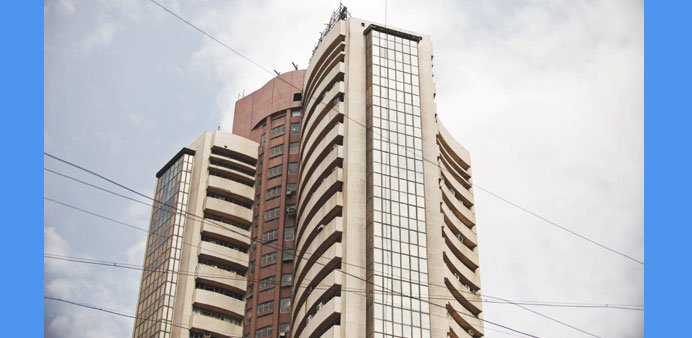The Bombay Stock Exchange building looms over a street in Mumbai. So far this year India is Asia’s third-best performing equity market and equity valuation multiples, indicating expected earnings growth are the second-highest in the region.
Reuters/Mumbai
Investors in India say the government’s first full budget must find a way to boost capital spending while exercising fiscal restraint, or a subsequent sell-off in debt and equities could destabilise the rupee, risking a return to levels seen in 2013.
Prime Minister Narendra Modi’s election victory nine months ago resulted in India becoming Asia’s second best performing stock market after China last year, despite lacklustre economic growth, as investors pinned hopes on sweeping reforms.
So far this year India is Asia’s third-best performing equity market and equity valuation multiples, indicating expected earnings growth are the second-highest in the region, although the economy is still struggling to gather momentum and Modi has yet to fulfil many election promises.
“Going by fundamentals, India is overvalued in equity markets,” said Ashish Vaidya, executive director and head of trading and asset liability management at DBS in Mumbai.
“Everyone expects the budget to kick-start the investment cycle, but that won’t happen overnight. The corporate sector is clearly slowing down, which is the biggest indicator of economic activity,” Vaidya said adding that risk-adjusted returns are better in the US than in India.
The average forward price to earnings ratio for 920 Indian stocks over the next year was 16.8 times, the second highest in emerging Asia as measured by Thomson Reuters StarMine Smart Estimates, which narrows predictions to top-rated analysts.
Foreign investors have poured in $8.21bn into Indian stocks and debt since the start of the year. At that pace, they could beat a record $42.34bn invested last year.
In the past 20 years, according to data collated by analysts at UBS, India’s index for top companies on the National Stock Exchange (Nifty) has outperformed emerging market peers four out of five times following a government’s maiden annual budget.
But this time, analysts warn markets have already priced in significant reforms.
Analysts and traders told Reuters equity markets could drop 6-8% if the pro-growth measures in the budget, due to be presented by Finance Minister Arun Jaitley on Saturday, fall short of expectations.
They also warned that bond yields could rise by 25-30 basis points to nearly 8% if the government strays too far from its fiscal consolidation roadmap.
A sell-off in stocks and debt could send the rupee tumbling, with some analysts predicting it could fall as low as 64-65 to the dollar, levels last seen when the currency was recovering from an all-time low of 68.85 struck on August 28, 2013.
India’s rupee currency is up nearly 1.2% this year against the dollar, the strongest appreciation among Asian peers, while bond yields are down more than 2%.
Foreign investors quizzed by Reuters said they were focused on a significant increase big ticket spending – as much as double last year’s increase of more than 20% – and specific improvements in the ease of doing business in India.
India’s governments have frequently missed spending targets, but investors are still hoping to see a strong hike – all while India tightens its fiscal belt, cutting back subsidies.
“A steady narrowing for the (fiscal) deficit is the single most important factor in Indian macroeconomics,” said Jan Dehn, head of research at Emerging Market specialist Ash more Group.
That will avoid the loose fiscal policy that has in the past forced the central bank to raise rates, choking growth.
Of course, some investors said they saw growth over the long term and could wait. Many more warned they were impatient.
“There is no spare change in people’s pockets. So if something interesting happens elsewhere, they will take profit in India,” said Andrew Graham, head of Asia-Pacific equities at Martin Currier in Edinburgh.

